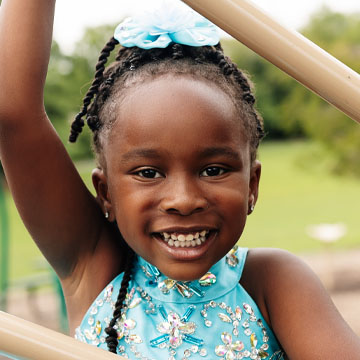Visit Vale Health Marketplace?
You are leaving balladhealth.org to visit Vale Health’s Wellness Marketplace.
Disclaimer: Ballad Health does not sponsor, endorse or recommend any product or resource listed in the marketplace.

Cleo is a true performer. She’s bubbly, friendly and loves to making people laugh. The first time she took center stage, she was just six months old and dolled up in a pageant dress. She usually participates in about three or four pageants a year. But things were put on hold last year when she was diagnosed with type 1 diabetes a week before her fifth birthday. Cleo’s world — and her mother’s — were suddenly turned upside down.
“We had to turn our attention to other things,” says her mother, Bethane.
Cleo had been complaining about headaches, but her pediatrician didn’t find anything wrong. Then one day, Cleo said she was dizzy as well, so Bethane took her to the Family Pediatric Emergency Department at Bristol Regional Medical Center, not far from their home in Glade Springs, Virginia. She was diagnosed with rhinovirus. But as a precaution, the doctor checked her urine, and that’s when she discovered Cleo’s blood sugar was unusually high. She was diagnosed with type 1 diabetes. Then, Cleo and her mother took an ambulance ride to Niswonger Children’s Hospital in Johnson City.
She was able to dress up again and enjoy participating in her first pageant since being diagnosed. She’s back to the life she loves.
Type 1 diabetes, a chronic autoimmune condition in which the pancreas produces little to no insulin, meant that Cleo would need to rely on regulating her blood sugar levels either through insulin injections or an insulin pump. Her insulin dose also would need to be varied based on food intake and activity levels.
Cleo and her mom had a lot to learn about managing her condition. During a three-night stay at the hospital, Cleo was given insulin to stabilize her blood sugar, and Bethane was taught how to monitor her daughter’s condition with insulin shots.
The next few months were a bit scary for both Cleo and her mother as they learned how to manage their “new normal.” Cleo’s pancreas was still producing a small amount of insulin, so they had to monitor Cleo’s blood sugar diligently.
The staff at Niswonger Children’s Hospital had provided Bethane with a number she could call anytime, day or night, for answers to questions regarding Cleo’s diabetes care. It was a huge relief. Cleo’s doctor also connected Bethane with other parents of children with type 1 diabetes, who gave her plenty of support.
The silver lining was meeting Cleo’s nurse practitioner at Niswonger Children’s Hospital, who is also has type 1 diabetes. She wears a blood monitor just like Cleo’s. “Cleo knows that her nurse understands what she’s going through,” Bethane says. “And that’s made her feel a lot better.”
Cleo’s managing so well that three months after her diagnosis, she was able to start kindergarten. And even more exciting, she was able to dress up again and enjoy participating in her first pageant since being diagnosed. She’s back to the life she loves.
The Niswonger Children’s Network is dedicated to improving the health and future of the Appalachian Highlands through expert pediatric care so that we can share more heartwarming stories like Cleo’s.
Read more Niswonger Children’s Stories here.